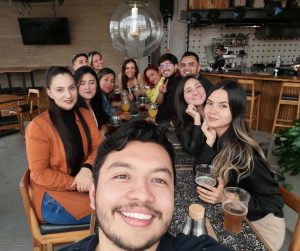Working in a startup can be one of the best schools anyone can have. Not only from a professional perspective, but also from a personal one. In this blog post I will talk about 5 things I have learned after completing my first year working in a Startup.

What took you from 0 to 100, will not take you from 100 to 1000
I heard this phrase from Freddy Vega in a Platziconf and it is something that sums up very well the way I think. Never settle and think that we have reached a ceiling. Somehow, we must see ourselves as a product that is never finished, we must always be improving and updating ourselves to be better and achieve more ambitious and challenging goals.
The need to be constantly learning becomes a necessity when you work in a Startup. In addition to developing the required technical skills to be able to improve at your job, it forces you to obtain endless soft skills that are valuable for life, such as resilience, adaptability, creativity, leadership, among others.
1) Having a purpose greater than yourself
One of my life’s purposes is to make a good impact on the world. I strive that all of my decisions and projects go towards this great purpose. In fact, my goal in a few years is to create a startup capable of solving a massive social problem, or at least be part of the solution, like poverty or corruption.
“Be one of the people who makes a difference in this world… To leave this world a litle bit better for my being here”
Jim Henson
When I was looking for internships, I was precisely looking for a place that had a similar vision and wanted to make an impact. That’s exactly what I saw at Vecindario. Immediately, I connected with the culture, the product and the people.
Therefore, my first learning and recommendation is to search for a job that is closely connected with your higher purpose. No matter how much the responsibilities, the colleagues, the KPIs change, there will be something more powerful that will continue to drive you to be better every day. As Simon Sinek says in his book Infinite Game: “In an organization that is only driven by the finite, we may like our jobs some days, but we will likely never love our jobs. If we work for an organization with a Just Cause, we may like our jobs some days, but we will always love our jobs.”

2) Tangible impact on what you do
I have heard that working at the right startup for a year is the equivalent of 7-10 years working at a traditional organization. This idea can be analyzed from different perspectives (salary, job tittle, responsibilities, etc), but I will focus on seeing it from the perspective of impact.
It makes a lot of sense, the growth and impact that someone is going to generate in a good startup is exponential, since startups should grow at a rate of 15%- 20% per month (even weekly). For this to happen, the people in the organization must grow at the same pace, constantly learning, experimenting, and adapting.
No matter wether start in an entry level job, the impact you are going to generate is enormous. For instance, the impact you have on a startup with 35 employees will be 2.85% —> 1(your work) / 35 (total work done by all employees) = 2.85% (Your impact in the organization). Since there are few, everything you do will be reflected in the results and growth of the company. Meanwhile, if you are in an organization with 2,500 employees where your work does not depend only on you, but on multiple circumstances, bureaucratic processes and other areas, your impact will be less (1/2,500=0.0004%). It will take more time and it won’t be as scalable.
This is why I have often heard several people who work in a large and traditional company who feel “just another number” or “just one of the bunch”.
3) The importance of knowing how to unlearn
Throughout this blog post I have talked about the importance of constantly learning. Curiously, something necessary to be a good learner is knowing how to unlearn. The fact of being mentally prepared and willing to constantly break down mental models that you thought were the “truth” is essential for you to be able to forge a mind capable of growing and learning new things.
Having a mind willing to constantly unlearn allows ideas to flow and always be thinking “how can I do this better?”. Normally, in a startup there´s nothing written in stone, thus, there are no immutable established processes that cannot be questioned and improved. In fact, almost everything is constant experimentation, which allows us to find new and better ways of doing things.
4) “Culture is not the most important thing, it’s the only thing” – Costco’s Jim Sinegal
The thing that impressed me the most when I joined Vecindario was the culture. Culture is essential and must be cared at all costs, the truth is that I came to understand it many months after I entered Vecindario. The culture ends up being a determining factor in getting and keeping the best talent.
For obvious reasons, startups cannot always compete in salaries with large companies, so it is necessary to structure a sufficiently solid vision and culture, which is capable of attracting talent on its own. This will ensure that people commit to something bigger than themselves, are motivated by something beyond money, and therefore increase the likelihood of retaining talent.
This implies that sometimes you have to make difficult decisions and stop hiring or let go of people who may be very good at what they do, but who don’t fit in the Startup’s culture. Since in the medium/long term they can destabilize and affect the strength of your culture. Not everyone should fit into a specific culture, it´s better not to force and only work with people that match the culture of the startup.
As much as is possible, it´s super important to hire talent that meets all the specifications that are required, but in my experience, sometimes it is better to find someone with the desire to learn and the passion to solve the problem that is being solved in the startup, since that some technical things can be learned. Something similar happened to me when I applied to Vecindario, I didn´t know many things that they needed for the job position, but my desire and ability to learn quickly were enough to obtain the job and perform optimally.
5) Transformational Leadership
The leadership found in Startups is truly transformative. It is the one that allows people to develop their maximum potential. From what I have seen, the best leaders have 3 important elements:
- Empower employees: Leaders provides the freedom to create, develop ideas and solve problems. They encourage employees to take the lead in different situations and yield certain important decisions. They are leaders that support and are always aware of the well-being of people.
- They are not just to lead: They have the technical knowledge and the mental disposition to work side by side with any member of the company when the situation requires it. This generates motivation and much more closeness with the collaborators.
- Absolute honesty: Either for feedback, to show the current situation or the aspirations we have, it is important to be honest and direct in all situations. This allows the work environment to be healthier and more transparent.
To conclude, there are undoubtedly many more lessons learned, but I think these 5 summarize the most important ones very well. If you have other important learnings from your experience, I would love to hear about them, write to me.

